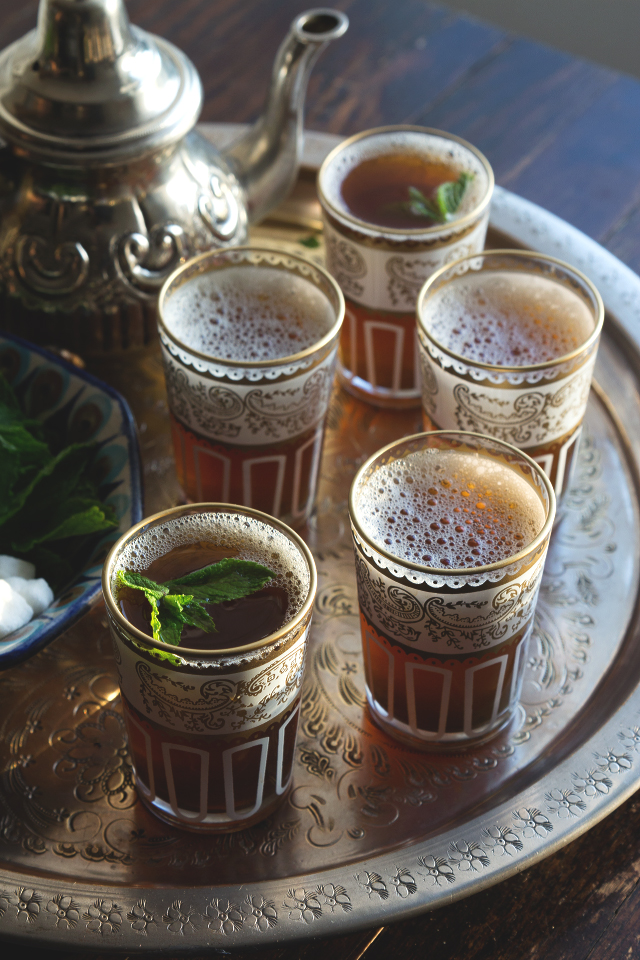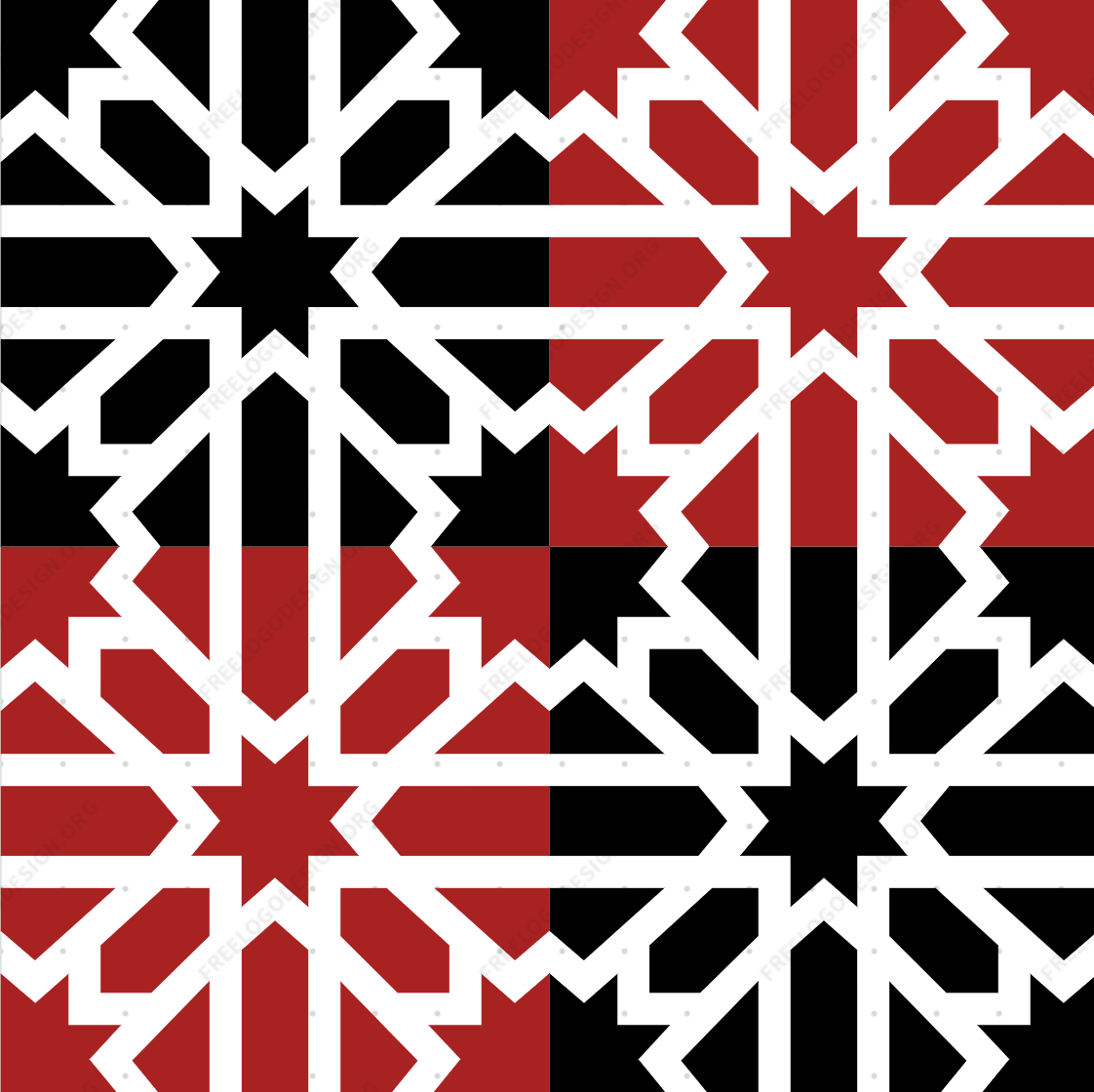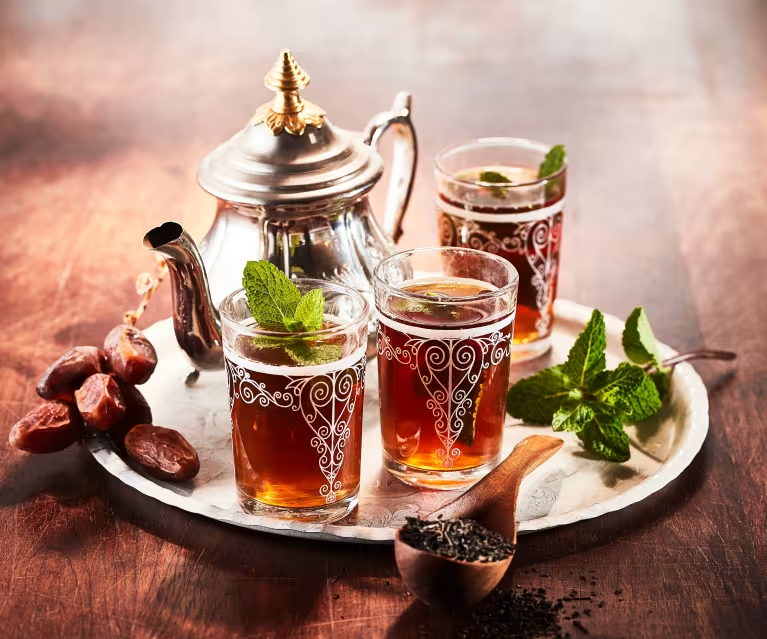Moroccan tea, often referred to as Moroccan mint tea or “atay,” is more than just a beverage; it is a symbol of Moroccan hospitality, culture, and tradition. This aromatic and refreshing tea, typically brewed with green tea leaves, fresh mint, and a generous amount of sugar, holds a special place in the hearts of Moroccans and has captivated tea enthusiasts worldwide. Let’s explore the rich heritage, traditions, and health benefits associated with this beloved drink.
A Heritage Steeped in History
Although tea itself was not invented in Morocco, the unique preparation and cultural significance of Moroccan mint tea are distinctly Moroccan innovations. The combination of Chinese gunpowder green tea, fresh mint, and sugar, brewed to create a sweet and refreshing beverage, was perfected by Moroccans and became an integral part of their social and cultural practices. This tea-making tradition reflects Morocco’s ability to incorporate foreign elements into its rich cultural tapestry, resulting in a beloved national drink that symbolises hospitality, community, and warmth.
In Moroccan households, tea is often served to guests as a gesture of welcome and respect. It is a social ritual that brings people together, whether they are family members, friends, or strangers. The preparation and presentation of tea reflect the care and affection Moroccans have for their guests, making it a cornerstone of social interactions.
The Art of Making Moroccan Tea
The preparation of Moroccan tea is an art form, requiring patience and precision. Here’s a step-by-step guide to making authentic Moroccan tea:
- Boil Water: Start by boiling fresh water in a teapot.
- Rinse the Tea Leaves: Add a small amount of Chinese gunpowder green tea to the teapot. Rinse the leaves with a bit of boiling water and discard the rinse water. This helps to clean the leaves and awaken their flavor.
- Brew the Tea: Fill the teapot with boiling water and let the tea steep for a few minutes.
- Add Mint and Sugar: Add fresh sprigs of mint and a generous amount of sugar to the pot. The amount of sugar can be adjusted according to taste, but Moroccan tea is traditionally quite sweet.
- Mix the Tea: Pour the tea into a glass from a height, then return it to the pot. Repeat this process several times to mix the ingredients thoroughly and create a frothy top.
- Serve: Finally, pour the tea into small glasses from a height to aerate it and enhance its flavor.
The result is a delightful blend of robust green tea, refreshing mint, and sweet undertones, served in elegant, often ornate glasses.
Traditions Around Moroccan Tea
Moroccan tea is more than just a drink; it is a central element of various cultural practices and ceremonies. Some of the key traditions include:
- Hospitality: Serving tea to guests is a mark of respect and hospitality. Refusing a glass of tea can be considered impolite.
- Social Gatherings: Tea is a staple at social gatherings, family reunions, and celebrations. It encourages conversation and connection.
- Business Meetings: In business settings, tea is often served before discussions begin, creating a relaxed and amicable atmosphere.
- Daily Ritual: Many Moroccans enjoy tea multiple times a day, often with meals or as a break from work.

Health Benefits of Moroccan Tea
Beyond its cultural significance, Moroccan tea offers several health benefits, thanks to its key ingredients:
- Green Tea: Rich in antioxidants, green tea helps to protect cells from damage, boost metabolism, and improve brain function. It also has anti-inflammatory properties and can aid in weight management.
- Mint: Mint is known for its soothing properties, helping to relieve digestive issues, reduce stress, and improve respiratory health. It also adds a refreshing flavor to the tea.
- Moderate Caffeine: Moroccan tea contains moderate levels of caffeine, providing a gentle energy boost without the jitters associated with coffee.
The combination of green tea and mint makes Moroccan tea a refreshing and healthful choice, promoting relaxation and well-being.
Conclusion
Moroccan tea is a true embodiment of the country’s rich heritage and traditions. Its preparation and serving are steeped in cultural significance, reflecting the warmth and hospitality of the Moroccan people. Beyond its cultural importance, Moroccan tea offers numerous health benefits, making it a delightful and nourishing beverage. Whether you are sipping it in a bustling Moroccan souk or enjoying it at home, Moroccan tea is a testament to the enduring allure of this ancient tradition. Check out more recipes on this website!

